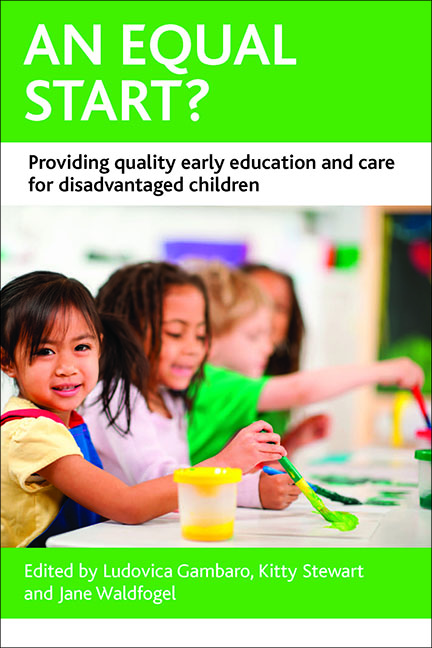Book contents
- Frontmatter
- Contents
- List of figures, tables and appendices
- Acknowledgements
- Notes on contributors
- one Introduction
- two Equal access to early childhood education and care? The case of the UK
- three Towards universal quality early childhood education and care: The Norwegian model
- four Equal access to quality care: Lessons from France on providing high-quality and affordable early childhood education and care
- five Equal access to high-quality childcare in the Netherlands
- six Access and quality issues in early childhood education and care: The case of Germany
- seven New Zealand: A narrative of shifting policy directions for early childhood education and care
- eight Early education and care in Australia: Equity in a mixed market-based system?
- nine Delivering high-quality early childhood education and care to low-income children: How well is the US doing?
- ten Common challenges, lessons for policy
- Index
eight - Early education and care in Australia: Equity in a mixed market-based system?
Published online by Cambridge University Press: 03 February 2022
- Frontmatter
- Contents
- List of figures, tables and appendices
- Acknowledgements
- Notes on contributors
- one Introduction
- two Equal access to early childhood education and care? The case of the UK
- three Towards universal quality early childhood education and care: The Norwegian model
- four Equal access to quality care: Lessons from France on providing high-quality and affordable early childhood education and care
- five Equal access to high-quality childcare in the Netherlands
- six Access and quality issues in early childhood education and care: The case of Germany
- seven New Zealand: A narrative of shifting policy directions for early childhood education and care
- eight Early education and care in Australia: Equity in a mixed market-based system?
- nine Delivering high-quality early childhood education and care to low-income children: How well is the US doing?
- ten Common challenges, lessons for policy
- Index
Summary
Introduction
Early childhood education and care (ECEC) is a high-profile political issue in Australia. In 2008, Labor Prime Minister Kevin Rudd promised ‘a world-class system of integrated early childhood learning and childcare’ designed to ‘boost national productivity, lift labour force participation, contribute to social inclusion and be the first step towards an “education revolution”’. A year later, the Council of Australian Governments (COAG), representing the Commonwealth, States, Territories and local government, endorsed an early childhood development strategy encompassing children from birth to eight years. Investing in the Early Years: A National Childhood Development Strategy sets out a ‘comprehensive response to evidence about the importance of early childhood development and the benefits – and cost-effectiveness – of ensuring all children experience a positive early childhood’ (COAG, 2009a).
As part of this new commitment to child wellbeing, the ECEC sector has undergone rapid and far-reaching reform. Again through COAG, governments have adopted consistent standards for both long day-care centres and preschools (COAG, 2009b). The standards apply equally to all mainstream services, whether private for-profit, non-profit or government-run. Governments have also endorsed the goal of universal access to preschool education, meaning that all children will have access to ‘a quality early childhood education programme … delivered by a four-year university trained early childhood teacher, for 15 hours a week, 40 weeks a year, in the year before formal schooling’ by 2013 (COAG, 2009d, p 5). Importantly, universal access is about participation in a particular type of programme rather than attendance at a particular type of service; a preschool programme can be delivered in a long day-care centre, a dedicated preschool/kindergarten or a mobile service that takes early learning experiences to children in remote communities. Australia's commitment to preschool for all children is not as far-reaching as similar initiatives in other countries. The phrase ‘universal access’ expresses an official aspiration, but does not establish an entitlement for children. And the 15 hours are not necessarily free; rather, governments have adopted the more nebulous goal of ensuring that ‘cost is not a barrier to access’ (COAG, 2009d, p 6).
An important aspect of the quality agenda is the endorsement of a national early childhood curriculum, the Early Years Learning Framework (EYLF) (COAG, 2009c). The EYLF sets out the principles, practices and outcomes required to support children's learning from birth, and to ensure a smooth transition to school.
- Type
- Chapter
- Information
- An Equal Start?Providing Quality Early Education and Care for Disadvantaged Children, pp. 171 - 192Publisher: Bristol University PressPrint publication year: 2014
- 1
- Cited by

